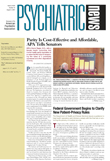Many fish stories are tall tales at best. But how about the one claiming that eating fish, or the omega-3 fatty acids that fish contain, can ward off depression?
Actually there may be something to it, accumulating epidemiological, biological, and clinical evidence suggests.
In one large, long-term epidemiological study, for instance, Japanese researchers found that a diet rich in fish appeared to protect subjects against depression and suicide. Other researchers have discovered that Icelanders experience less seasonal depression than one would expect at their high latitude; the researchers think it may be because Icelanders are big fish eaters. Several groups of scientists have reported a depletion of omega-3 fatty acids in the cell membranes of patients with major depression.
Then Andrew Stoll, M.D., of McLean Hospital in Belmont, Mass., and his coworkers gave 15 bipolar patients mood stabilizers and 15 other bipolar patients mood stabilizers plus a dietary supplement of omega-3 fatty acids for four months. Those patients getting the supplement experienced fewer episodes of mania and depression during the test period, Stoll and his colleagues reported in the May 1999 Archives of General Psychiatry.
And now still more support for the “tale” that fish can counter depression comes from Finnish researchers Antti Tanskanen, M.D., a psychiatrist at the University of Kuopio, Finland, and his coworkers.
To explore a possible association between a fish diet and depression, Tanskanen and his team designed a questionnaire that combined questions about diet with the 21-item Beck Depression Inventory, which measures both depression and suicidal tendencies. Tanskanen and his team sent the questionnaire to a random sample of some 3,000 residents of Kuopio. Fifty-nine percent (1,767) responded.
The researchers analyzed the responses and, as they report in the May Archives of General Psychiatry, “frequent fish consumers—that is, those eating fish two or more times a week—appeared to suffer significantly less from depression and suicidal tendencies than did those eating less or no fish.”
True, this study, like all epidemiological ones, does not prove causation, Stoll wrote in an editorial accompanying the report. Still, he believes that the data emerging on the fish-depression connection are becoming more and more compelling, and he argues that more clinical studies, and especially well-controlled clinical studies, be conducted on the subject.
His wish, in fact, may be fulfilled before long. David Mischoulon, M.D., a psychiatrist with Massachusetts General Hospital in Boston, and colleagues are planning a double-blind, placebo-controlled study to determine whether omega-3 fatty acids can counter unipolar depression. In this trial, certain unipolar depression subjects will be given omega-3 fatty acids as their sole form of treatment while other unipolar depression subjects will receive a placebo. If all goes as planned, Mischoulon told Psychiatric News, the study will get under way this summer.
The study, “Fish Consumption, Depression, and Suicidality in a General Population,” is posted on the Web at http://archpsyc.ama-assn.org under “Past Issues” and “May.” ▪

